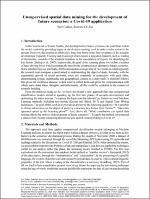Chapter Unsupervised spatial data mining for the development of future scenarios: a Covid-19 application
Author(s)
Calleo, Yuri
Di Zio, Simone
Language
EnglishAbstract
In the context of Futures Studies, the scenario development process permits to make assumptions on what the futures can be in order to support better today decisions. In the initial stages of the scenario building (Framing and Scanning phases), the process requires much time and efforts to scanning data and information (reading of documents, literature review and consultation of experts) to understand more about the object of the foresight study. The daily use of social networks causes an exponential increase of data and for this reason here we deal with the problem of speeding up and optimizing the Scanning phase by applying a new combined method based on the analysis of tweets with the use of unsupervised classification models, text-mining and spatial data mining techniques. For the purpose of having a qualitative overview, we applied the bag-of-words model and a Sentiment Analysis with the Afinn and Vader algorithms. Then, in order to extrapolate the influence factors, and the relevant key factors (Kayser and Blind, 2017; 2020) the Latent Dirichlet Allocation (LDA) was used (Tong and Zhang, 2016). Furthermore, to acquire also spatial information we used spatial data mining technique to extract georeferenced data from which it was possible to analyse and obtain a geographic analysis of the data. To showcase our method, we provide an example using Covid-19 tweets (Uhl and Schiebel, 2017), upon which 5 topics and 6 key factors have been extracted. In the last instance, for each influence factor, a cartogram was created through the relative frequencies in order to have a spatial distribution of the users discussing each particular topic. The results fully answer the research objectives and the model used could be a new approach that can offer benefits in the scenario developments process.


 Download
Download Web Shop
Web Shop